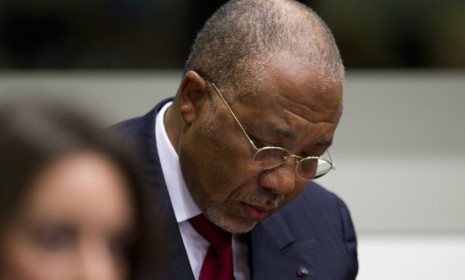Liberian strongman Charles Taylor's war crimes conviction: What now?
An international tribunal throws the book at Taylor for aiding and abetting brutality in Sierra Leone during a murderous militia's 11-year reign

A free daily email with the biggest news stories of the day – and the best features from TheWeek.com
You are now subscribed
Your newsletter sign-up was successful
A special international tribunal in The Hague convicted former Liberian leader Charles Taylor for a whole host of war crimes on Thursday, making Taylor the first head of state convicted of war crimes and crimes against humanity since the post–World War II Nuremberg trials. The historic verdict came after a three-year trial, from 2008 to 2011, with 94 witnesses. The judges took a year to deliberate. Here, a guide to Taylor's crimes, and some predictions as to what his conviction means:
What was Taylor convicted of?
The litany of crimes tied to Taylor is long and chilling: Fomenting a long, bloody civil war starting in 1989 that killed some 200,000 people; forced an estimated 20,000 children to fight, kill, and rape; and employed sexual violence, disfigurement, and displacement as deliberate war tactics. "But none of that is why he was tried," says Ian Smille at Canada's The Globe and Mail. Instead, Taylor was convicted of aiding and abetting war crimes and crimes against humanity in Sierra Leone by backing the brutal Revolutionary United Front (RUF) militia in its 11-year reign of terror from 1991 to 2002.
The Week
Escape your echo chamber. Get the facts behind the news, plus analysis from multiple perspectives.

Sign up for The Week's Free Newsletters
From our morning news briefing to a weekly Good News Newsletter, get the best of The Week delivered directly to your inbox.
From our morning news briefing to a weekly Good News Newsletter, get the best of The Week delivered directly to your inbox.
What did the RUF do?
"Led by a psychopath named Foday Sankoh, who had trained with Mr. Taylor in happier times at Moammar Gadhafi's school for terrorists," the RUF was a band of bloodthirsty murderers masquerading as pro-democracy rebels, says Smille at The Globe and Mail. The militants were infamous for hacking off civilians' feet and hands, committing rape on a wide scale, using captured women and girls as sex slaves, pressing others into labor in diamond mines, and forcing children to join their army after savagely killing their families. More than 1,000 children had the letters RUF carved into their backs so they wouldn't flee.
And Taylor supported the RUF?
Yes. He facilitated huge arms shipments to the RUF in exchange for "blood diamonds" from gem-rich Sierra Leone, and gave the militia financial support and save haven at Liberian bases.
A free daily email with the biggest news stories of the day – and the best features from TheWeek.com
What will happen to Taylor next?
Once he is sentenced on May 30, Taylor "will, in all probability, see out his days in a British prison," says David Blair at Britain's Telegraph.
What other heads of state have been convicted by an international court?
The only other member of that list is Karl Doenitz, the Nazi naval commander who led Germany briefly after Adolf Hitler's suicide, and who was convicted at Nuremberg. Since then, alleged war criminals have either died natural deaths (Uganda's Idi Amin, Cambodia's Pol Pot, and Chile's Augusto Pinochet), been killed in their home country (Iraq's Saddam Hussein and Libya's Moammar Gadhafi), or died in jail before being convicted (Serbia's Slobodan Milosevic). But Taylor probably won't be the last contemporary leader nailed for war crimes: Ivory Coast's Laurent Gbagbo and Bosnia's Radovan Karadzic are awaiting trial or a verdict at The Hague, Sudan's Omar Bashir has been indicted, and several local warlords are in jail or wanted.
What effect will this have on other accused war criminals?
It's a double-edged sword. In one sense, Taylor's conviction "sends a signal that authorities are finally moving to end impunity, establish the rule of law, promote and encourage respect for human rights, and restore and maintain international peace and security," says Brima Sheriff at CNN. But this is also a reminder that "international justice has many drawbacks," says The Telegraph's Blair. Nobody is clamoring for the arrest of Rwanda's Paul Kgame, for example, though he also armed the rebels next door. Clearly, justice is selective.
Sources: AP, CNN, Daily Beast, Globe & Mail, Los Angeles Times, Moderate Voice, Telegraph
-
 The ‘ravenous’ demand for Cornish minerals
The ‘ravenous’ demand for Cornish mineralsUnder the Radar Growing need for critical minerals to power tech has intensified ‘appetite’ for lithium, which could be a ‘huge boon’ for local economy
-
 Why are election experts taking Trump’s midterm threats seriously?
Why are election experts taking Trump’s midterm threats seriously?IN THE SPOTLIGHT As the president muses about polling place deployments and a centralized electoral system aimed at one-party control, lawmakers are taking this administration at its word
-
 ‘Restaurateurs have become millionaires’
‘Restaurateurs have become millionaires’Instant Opinion Opinion, comment and editorials of the day